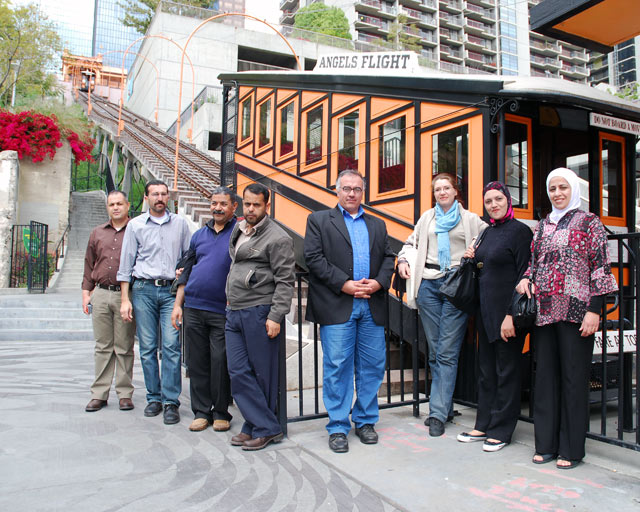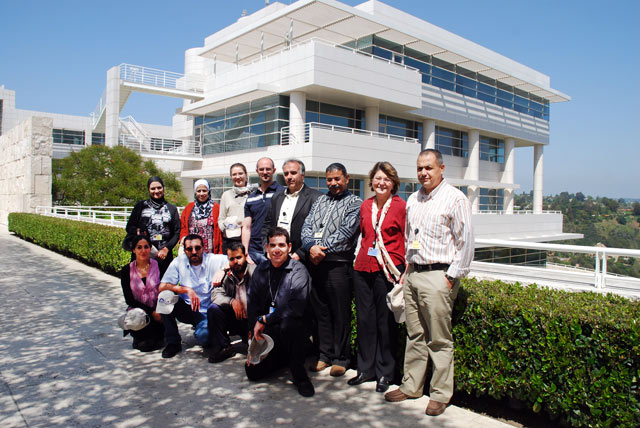
Left to right: Sa\’te Masa\’deh, Ahmad Lash, Ali al-Owaisi, Tawfiq al-Huniti, Khaled Ziout, Catreena Hamarneh, Woroud Samara, Samar al-Habahbeh
When eight colleagues from Jordan’s Department of Antiquities (DoA) came to the Getty Conservation Institute (GCI) in early April, they had only an inkling of what was in store. Sure, they knew they were going to be trained on “MEGA-J,” an innovative, bilingual Arabic-English Web-based national geographic information system (GIS) that will revolutionize the management of archeological sites in Jordan.
But they didn’t expect to become part of a close-knit global community of scientists and conservators, or to come together themselves as a team, despite working in different offices across the country.
“Our expectation was that we were just coming here for training and to meet with different specialists. But the importance of this experience goes far beyond that, with all the interactions, panel discussions, learning about the Getty, and seeing the cultures mix,” said Woroud Samara, Inspector of Archaeology at the Irbid Antiquities Office, who met with her colleagues and a group of Getty staffers over take-out pizza at the GCI recently.

Top, left to right: Woroud Samara, Samar al-Habahbeh, Catreena Hamarneh, Adam Lodge (Farallon Geographics), Khaled Ziout, Ali al-Owaisi, Alison Dalgity, Sa\’te Masadeh; Bottom row, left to right: Azadeh Vafadari (GCI consultant), Ahmad Lash, Tawfiq al-Huniti, Michael Aronowitz
“We have come together as a family to raise a baby, MEGA-J, which we want to nurture to live the life it should,” said Catreena Hamarneh, head of the Archaeological Documentation Section of the Department of Antiquities of Jordan, and Coordinator of MEGA-J.
MEGA-J is an easy-to-use Web-based inventory and management tool that maintains information on archaeological sites. Ultimately, it will help standardize and centralize information on archaeological sites throughout the country in a single system that will be focused primarily on heritage management and research.
It was designed by the GCI, its partners, and the Jordanian stakeholders to replace an inventory that had fallen out of use. It’s sorely needed. “We’re developing very fast,” said Ali al-Owaisi, restoration engineer at the Jarash Archaeological Site. “With this tool we can make sure public works avoid damaging archaeological sites.” That’s an all-too-familiar scenario facing many irreplaceable archaeological sites around the world as the pressure for development increases.
The bond they’ve developed with each other and their colleagues at the Getty may have been surprising, but it isn’t incidental to the ultimate success of MEGA-J in Jordan, and, eventually, other countries in the Middle East. “The important thing is the partnership,” said Susan Macdonald, head of Field Projects at GCI. “It’s not our country, it’s not our heritage; the success of the project is dependent on our collaboration and partnership with the DoA and is what sustains the work.”
Other revelations that awaited the Jordanians? Visiting the Catholic church near their Santa Monica hotel and running into Governor Arnold Schwarzenegger. The variety of languages they heard, the lack of car horns, the inexplicable patience of motorists who waited for pedestrians to cross the street, and the incessant jogging they saw everywhere around them. Oh, and the earthquake on their second day in L.A.

One of many pleasant surprises: a chance meeting with Arnold Schwarzenegger. With him are Sa\’te Masa\’deh and Ahmad Lash, from left.
Perhaps most surprising was the friendliness they encountered everywhere they went. “You can never get lost here. Everyone’s ready to help,” said Hamarneh.




Thank you for everything I spent a good time in the GCI . It is a major task in maintaining the World Heritage . you were wonderful
Thank you for everything I spent a good time in the GCI . You are doing a great job .It is a major task in maintaining the World Heritage . you were wonderful